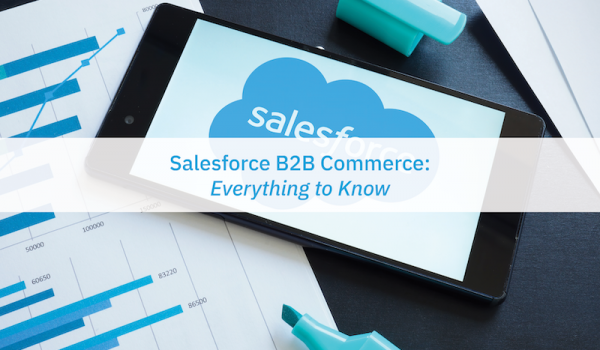
Salesforce B2B Commerce is among the most powerful and popular business tools on the market. Below, we define the features, benefits, and tips to make the platform work for you.
Ecommerce as a sales channel has really picked up in the last decade. As consumers, we’re now well accustomed to ordering a product online and getting it delivered to our home. Yet it wasn’t so long ago that it would be hard to imagine adding something to an online shopping cart, paying for it online, and then receiving the order on the front steps after a few days.

Contrast that experience to speaking with a sales representative and relying on their help to place an order. Which process is less time consuming and frictionless?
Salesforce B2B Commerce brings that same ease and convenience to business-to-business sales. Let’s dig in to see the definition, features, and benefits of this popular and powerful platform.
Newsletter sign up
"*" indicates required fields
B2B Commerce
Business-to-business orders can run into hundreds of units worth thousands—or tens of thousands of dollars. Unless the item purchased is unique and requires special attention, businesses would rather place orders for items online, just like individual consumers do.
To empower your business customers to place orders directly on your website, Salesforce has created Salesforce B2B Commerce. The Salesforce B2B ecommerce platform is designed to suit the complex B2B buying journey, including negotiated pricing, account-specific terms and conditions, and discounts, to give your business customers a superior online buying experience.
What is Salesforce B2B Commerce?
Salesforce B2B commerce is a low-maintenance solution that customizes ecommerce for business buyers. It lets companies build personalized ecommerce storefronts specifically tailored to large-volume purchases, with fast setup and a seamless, self-managing customer experience that maximizes profits.
How Salesforce B2B Commerce Helps
Salesforce B2B Commerce adds robust B2B features to the already powerful Salesforce platform. Other Salesforce tools already serve B2B business needs with a full range of products in the Salesforce Commerce Cloud. For example, Salesforce Sales Cloud helps with managing leads and opportunities, Service Cloud helps with service delivery, and Salesforce CPQ helps manage complex bundles and pricing.
The missing piece of the puzzle is an online storefront for self-checkout. The Salesforce B2B Commerce CRM fills that gap, working seamlessly with the other tools to create an end-to-end buying experience for both self-checkout and sales-rep-assisted orders. In our opinion, it’s hands-down the best B2B ecommerce platform on the market.
Built on the Salesforce Lightning platform, Salesforce for B2B comes pre-integrated with the Salesforce CRM, allowing sales, service, and marketing to dovetail, providing sophisticated 360-degree customer insights.
Benefits of Choosing Salesforce B2B Commerce
Salesforce B2B Commerce drives revenue by reducing selling costs and creating a more user-friendly, large-volume buying experience. The platform lets business customers get what they need faster, with less effort, while spending less time interacting with sales agents.
Here are the top-line benefits of choosing Salesforce B2B Commerce:
- Lower selling costs: The cost of selling through an online portal is significantly lower than selling by using sales representatives. If your customer can order products without relying on assisted selling, you’ll free up time for your sales team to tackle higher-order tasks and create more revenue.
- User-friendly interface: Salesforce for ecommerce B2B is built on the Salesforce Lightning Platform, offering a sleek and functional UI. It delivers a relatively simple learning curve and a long list of easy-to-use features.
- Personalized recommendations: The Salesforce B2B commerce cloud can anticipate customer needs automatically based on past orders, quantities, prices, and customer habits. Fast reorder options and personalized discounts and promos are available straight out of the box.
- Multiple payment options: The Salesforce B2B Commerce platform supports multiple payment options such as ACH, PO, or credit card. This makes it easier and faster for your business clients to get what they need in a way that fits their workflows.
- Suited for B2B business needs: B2B companies need to tailor their offerings to support large-volume orders. Features like multiple delivery options, stock availability checks, and notifications for newly available products help streamline the business-customer experience.
Salesforce B2B Commerce Platform Features
Salesforce B2B Commerce delivers the following key features to help you set up a powerful B2B online store for your customers:
-
- Catalogs and product data: Salesforce lets you set up multiple catalogs with different categories and product families. No matter how complex your product categories are, Salesforce B2B Commerce will be able to handle it.
- Customer-specific pricing: B2B buyers may have access to different prices depending on their contracts. Salesforce B2B Commerce helps to maintain negotiated pricing by account segments.
- Personalized storefronts: High-value customers can enjoy their own personalized storefront with their own brand colors and themes.
- Complex shipping functionality: Businesses often buy supplies and products for different locations at the same time. With Salesforce shipping groups, you can place orders for multiple locations within the same single order.
- Rapid reordering: Businesses may buy the same list of items every 15 days or once a month. Rapid reorders make it easy to place repeat orders quickly using just a few clicks.
Best Practices for Getting the Most Out of Salesforce B2B Commerce
Salesforce B2B Commerce provides several valuable tools and functionalities for businesses to start enabling their customers to place orders online. But to get the most out of this powerful platform, you need to follow certain best practices. Following are the most important best practices to follow when implementing and maintaining your online storefront in B2B commerce on Salesforce.
-
- Avoid “big bang switchover” strategy: If your customers are accustomed to buying from sales representatives, it’s important to ensure the transition to ecommerce happens gradually and not overnight. Initially, it’s a good idea to keep both in-person and ecommerce sales channels available for your customers. When you start the transition, help your customers place their first few orders online. As the change begins, open up a communication channel to report issues or bugs they experience while using the online ecommerce store.
- Use templates, AppExchange apps, and out-of-the-box features as much as possible: Salesforce B2B Commerce provides templates and out-of-the-box features to help you accelerate the deployment of your online store. You’ll get good value from using as many of these features as possible, since using them is much easier than customizing every aspect of your store.
- Get the help of an experienced Salesforce Consulting Partner: Salesforce recommends getting the help of an experienced Salesforce Consulting Partner or Salesforce Professional Service to implement the store. You’ll need to set up several details such as catalogs, product families, products, and prices. A Salesforce partner can guide you through the journey to help you avoid costly mistakes at the outset.
- Use other Salesforce applications: Leverage the power of other Salesforce applications like Sales Cloud to maintain leads and opportunities, Service Cloud for providing service, CPQ for complex product bundles and pricing, and Marketing Cloud for creating campaigns and promotions. Working together with B2B Commerce, these useful apps provide an end-to-end solution to run your business smoothly on the Salesforce platform.
- Integrate with other AppExchange applications: Apps from the Salesforce AppExchange can provide ready-made solutions to jumpstart your B2B commerce journey. AppExchange apps can take care of processes not covered by Salesforce, like accounting or ERP. Accounting Seed for example is built natively on the SF platform, helping to save significant time and cost by taking care of accounting, billing, payables, receivables, inventory management, and ERP all in one easy bundle.
The Best Salesforce Apps When Using Salesforce for B2B Commerce
There are multiple apps built especially by Salesforce Labs for B2B commerce. The apps below provide a good sampling of best-in-class applications that can smooth your transition to Salesforce B2B.
- B2B Cart Upload offers options for customers to upload multiple items to a cart in one go.
- B2B Product Wizard can help B2B businesses update their product data directly.
- SFDC Data Manager makes it easier to create and validate your org data.
- B2B Commerce Assistant helps with multiple configurations and validation.
- B2B Product Catalog provides an intuitive view to shop, browse, and share recently viewed or purchased items.
- CPQ for B2B helps connect your product catalogs to your pricing data and streamline your channel experiences.
Apart from the powerful Salesforce B2B Commerce apps above, there are other apps that can help simplify B2B commerce by adding other functions. Search the Salesforce AppExchange to find some excellent applications to help with functions like tax automation, fraud check, accounting, general ledger, and PayPal payment.
Simplify Salesforce B2B Commerce With Accounting Seed
Accounting Seed is one of the top-rated AppExchange apps, combining general ledger, accounts receivable, accounts payable, fund accounting, inventory management, project accounting, configurable invoice formats, automated billing, and online payment processing into one easy-to-use platform.
The integration of Accounting Seed with Salesforce B2B Commerce makes the platform more powerful. The B2B Salesforce ecommerce platform handles the online storefront experience while Accounting Seed takes over the backend inventory management, ledger entries, payables, receivables, and payment recognition.
To see how smooth your B2B Commerce workflows can be, request a demo of Accounting Seed today.
At a Glance: Salesforce B2B Commerce Key Takeaways
Salesforce B2B Commerce is one of the most useful platforms for business-to-business sellers. As you make the transition to Salesforce B2B, keep a few key points in mind:
-
- Salesforce B2B Commerce is a way for B2B customers to place bulk orders. Without this self-service platform, bulk ordering can require several manual steps from sellers.
- The Salesforce business-to-business sales platform is designed to reduce the go-to-market time for your online store. It also cuts service costs and therefore increases ROI.
- Leverage the Salesforce B2B Commerce platform along with other Salesforce apps to get a 360-degree view of your buyer.
- Apps from the Salesforce AppExchange like Accounting Seed provide further value by adding billing, orders, payables, inventory management, and General Ledger entry capabilities to the Salesforce platform.
Read on:
- Salesforce Joined Reports: What are They and What to Know
- Salesforce Order Management: Everything to Know
- Is Salesforce a Good CRM for Nonprofits?
- Is Salesforce a Good CRM for Manufacturers?
- Best Vendor Payment Processes for Businesses
- How to Make Business Financial Statements
- Best Financial Dashboards for Your Business
- Top 7 Issues Accountants Face Today
- Accounting Cybersecurity: How to Keep Financial Data Safe and Secure
- DCAA Compliant Accounting Software: What to Look For
- What are the International Accounting Standards (IAS)?
- Top 8 Reasons Why IT Implementations Fail
- What is Cash Disbursement in Accounting?
- Accrued Expenses: What are They And How to Report Them?
- Intro to Accounts Payable and Purchase Order Accounting
- Do I Need Accounting Software for My Small Business?
A native Salesforce accounting app, Accounting Seed, provides a full 360-degree view of your business’ performance to help you and your team make the best decisions possible. Not on Salesforce? Our software can be customized to work with any system you have through a reliable connection.
See Accounting Seed in action
Get a close-up view of how accounting on Salesforce can eliminate the need for costly integrations—and silos of mismatched information—by sharing the same database as your CRM.



